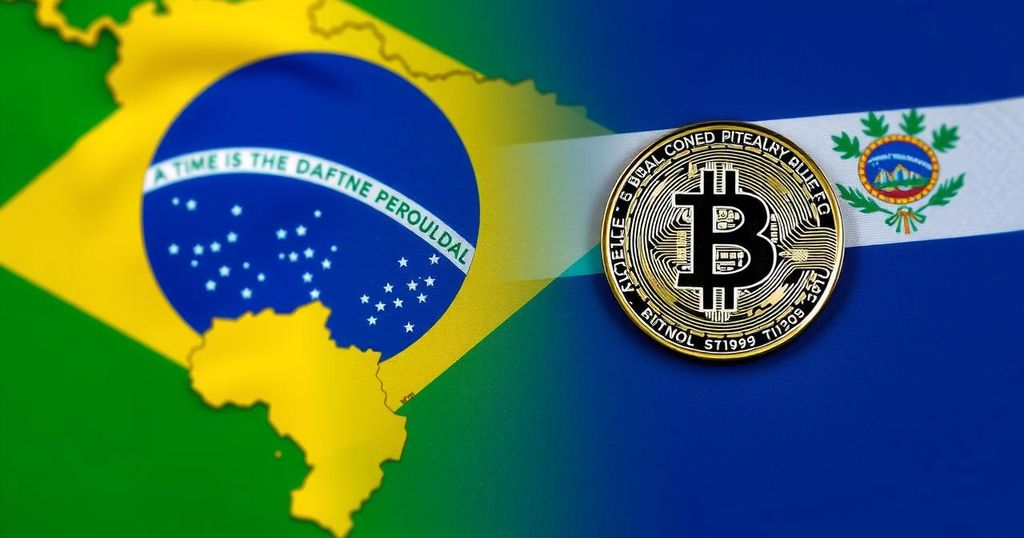Latam Insights: Brazil Advocates for National Currencies, Bitcoin Adoption Declines in El Salvador, Argentina’s Smart Contracts Legally Recognized
Brazil advocates for the use of national currencies over the U.S. dollar among BRICS nations; El Salvador experiences a significant decline in bitcoin adoption despite government initiatives; Argentina achieves a legal milestone with its first recognized smart contract.
In a recent week’s update on Latin America’s economic and cryptocurrency landscape, several significant developments emerged, with a primary focus on Brazil’s efforts to shift BRICS member countries away from reliance on the U.S. dollar, the declining bitcoin adoption rate in El Salvador, and Argentina’s landmark decision regarding the legal status of smart contracts. Brazil’s Foreign Affairs Secretary for Asia and the Pacific, Eduardo Paes Saboia, indicated that Brazil is championing the adoption of national currencies for trade among BRICS nations, which include Brazil, Russia, India, China, and South Africa, with additional members such as Egypt, Iran, the United Arab Emirates (UAE), Saudi Arabia, and Ethiopia joining in 2024. Mr. Saboia reported that discussions geared toward diminishing dependence on the dollar are already underway among finance ministers and central bank governors of BRICS nations and expressed optimism that such discussions would be highlighted during the upcoming BRICS summit in Kazan. On a disparate note, El Salvador has faced challenges with bitcoin adoption, despite substantial government initiatives to promote its use following the currency’s designation as legal tender in 2021. According to a survey conducted by the Center for Citizen Studies, Disruptive Magazine, and Francisco Gavidia University, only 7.5% of respondents reported using bitcoin for transactions, a drop from 12% observed in a previous year. Local experts have criticized these low adoption levels, emphasizing the considerable investments made by the government to stimulate usage, including a $30 airdrop for citizens who registered for the government-built Chivo bitcoin wallet. In contrast, Argentina has achieved a significant legal breakthrough concerning smart contracts. Reports indicate that Argentina has officially recognized its first Cardano-based smart contract, which entailed a four-month loan agreement with an interest of 10% between Mauro Andreoli and Lucas Macchia. This advancement enhances the enforceability of such contracts in Argentine courts, and while both parties signed a supplementary legal document due to the digital nature of smart contracts, the approval represents a notable milestone both locally and potentially globally.
The focus of this weekly update highlights ongoing shifts within Latin America’s economic framework and the role of cryptocurrency within this system. Brazil’s push within BRICS signifies a strategic move away from the traditional dominance of the U.S. dollar, aiming to bolster regional trade and economic independence. In contrast, the situation in El Salvador illustrates the complexities and challenges of adopting new financial technologies, especially when government initiatives do not translate into expected public engagement. Meanwhile, Argentina’s recognition of smart contracts marks an important evolution in the legal landscape regarding digital contracts, fostering new opportunities in blockchain applications.
In this week’s spotlight on Latin American economic and crypto developments, it is evident that while Brazil seeks to redefine trade dynamics within BRICS by advocating for national currencies, El Salvador encounters significant hurdles in bitcoin adoption, reflecting a need for effective strategies that resonate with its citizens. Conversely, Argentina’s successful legal acknowledgment of smart contracts signals a progressive step in the region’s embrace of digital innovation. Each of these narratives underscores the multifaceted and evolving nature of economic relations and digital currencies in Latin America.
Original Source: news.bitcoin.com




Post Comment